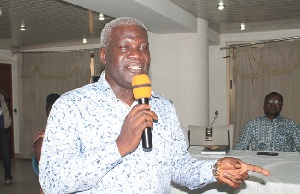A large number of informal workers, estimated at about90% of the total workforce, who do not contribute to Social Security and National Insurance Trust (SSNIT)Pension Scheme – rendering them vulnerable in old Age – are being systematically organised into the mainstream formal sector of the economy.
The issue of job insecurity for informal sector workers has been an intractable one for decades, due to the myriad of factors organised labour finds itself confronted by. In the mid-1960s, the Trade Union Congress (TUC) urged all its affiliates to endeavour to organise the informal workers based on its research showing that segment of the economy has a low level of organisation – but this aim has not seen any significant impact up till now.
Responding to questions by journalists in Accra, the General Secretary of the Industrial and Commercial Workers Union (ICU), Mr. Solomon Kotei, said his outfit has for some time now embarked on vigorous moves to unionise over 25,000 workers in this sector, so that they can contribute to the SSNIT pension scheme and other benefits their counterparts in the formal sector enjoy.
The over-25,000 workers, he explained – including the Ghana Hairdressers and Beauticians Association; Batik producers; Accra Markets Workers; Barbering and Drinking Bar Operators – are also being organised into the formal sector.
See Also: GCIC examines state of Entrepreneurial Ecosystem in Ghana The ICU General Secretary explained that unlike the formal sector which can easily be reached, the informal workers are liberally spread across the country, some in rural agriculture, petty traders, services sector workers etc. which is not cost-effective to undertake – yet the ICU is making headway in bringing many workers in this sector onboard.
Mr. Kotei said the Registrar-General should endeavour to capture a huge number of businesses in the economy that are not registered and enable Organised Labour to lead a crusade to get these workers unionised so as to ensure industrial harmony and productivity.
He said under the constitution and labour laws, every worker has the right to form or join any association of his choice without any fear for his job security and old-age era. One major factor, he said, that has been an obstacle to unionisation of workers – especially in some private foreign companies – is the mindset of the employers that once the workers are unionised and they may have bargaining power, the company’s overhead costs may hike as a result of payments for some fringe benefits as well as SSNIT dues: and, also, the leaders of these unions would become a part of the decision-making process in their companies.
Mr. Kotei said despite the relatively robust legal framework governing employment in the country, many informal workers continue to suffer discrimination, unlawful termination of appointment and low wages – and sometimes even physical abuse by their employers; and hence urged the National Labour Commission (NLC) to act swiftly and decisively whenever some of these cases are reported to it.
The Attorney General’s Department should also impose stiffer punishments on any employer who abuses the rights of any worker. Mr. Kotei said ICU has now been able to reach out to tertiary institutions in the country to sensitise their students on the relevance of forming or joining unions after graduation. ICU, he said, now has offices in all the 16 regions to enhance its activities.
Click to view details



Business News of Friday, 13 March 2020
Source: thebftonline.com

















